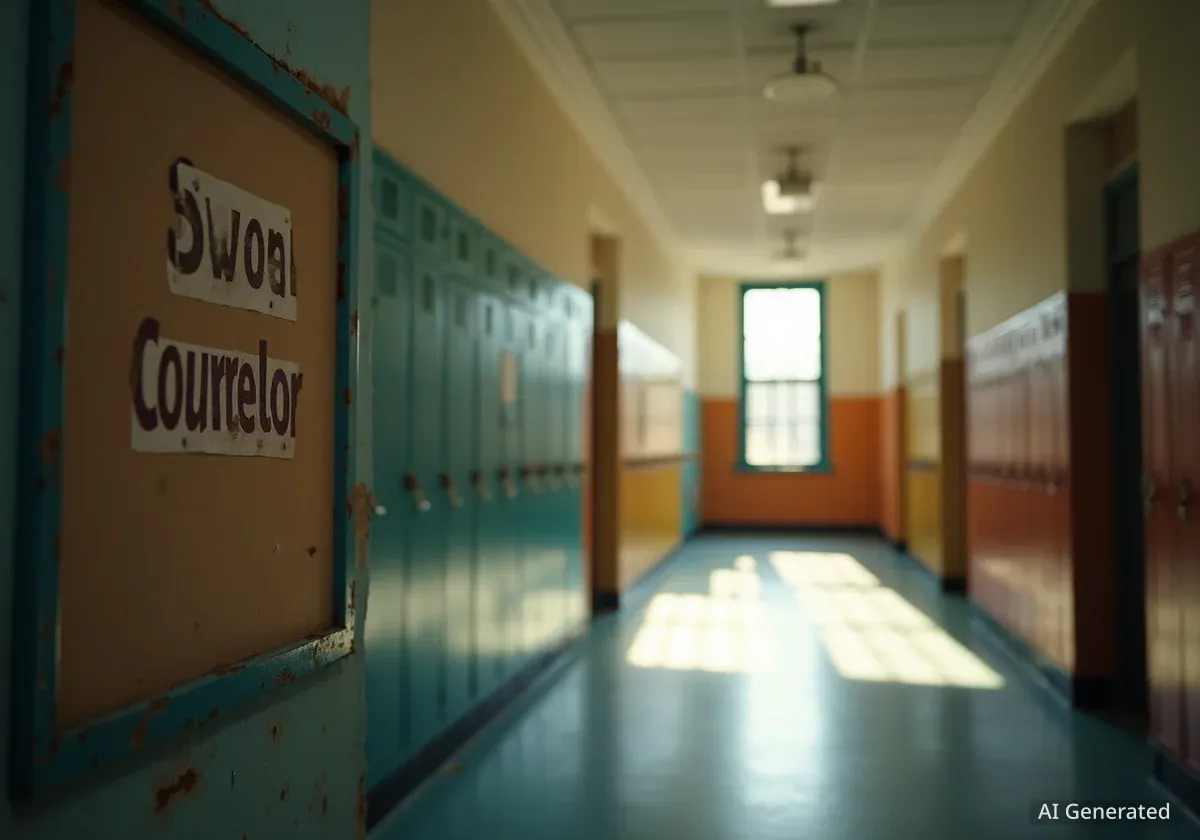The U.S. Department of Education has abruptly canceled approximately $168 million in federal grants designated for student mental health services in California. The decision, which affects 49 grant recipients, will terminate funding midway through five-year programs and is expected to eliminate hundreds of clinical positions in schools across the state, particularly in high-need rural areas.
School districts, county education offices, and universities were notified on April 29 that the funds would be withdrawn effective December 31. The department cited that recipients had not met standards of “merit, fairness and excellence in education” and failed to align with the “priorities and policy preferences” of the administration.
Key Takeaways
- The U.S. Department of Education is cutting about $168 million in mental health grants for California schools.
- The funding termination affects 49 recipients and will take effect on December 31.
- Rural districts in Northern California, including Eureka, Northern Humboldt, and Del Norte, will lose over $12 million.
- Hundreds of school-based social workers, counselors, and wellness coaches are at risk of losing their jobs.
- California has joined a 17-state lawsuit against the Department of Education to challenge the cuts.
Federal Grants for Student Wellness Rescinded
School districts across California are preparing for significant disruptions to student support systems following a federal decision to end critical mental health funding. The grants were part of a multi-year federal initiative designed to address a growing student mental health crisis, which experts say was made worse by the COVID-19 pandemic.
The funding supported a wide range of services, including one-on-one therapy, crisis intervention, substance abuse programs, and suicide prevention. For many districts, especially those in underserved regions, these federal dollars were essential for hiring and retaining qualified mental health professionals.
The cancellation has created uncertainty and forced administrators to make difficult decisions about the future of these programs. Many districts now face the challenge of finding alternative funding sources on short notice or eliminating services that students have come to depend on.
Legal Challenge Underway
In response to the funding cuts, California has joined a coalition of 16 other states in a lawsuit against the U.S. Department of Education. The suit argues that the cancellation of these grants is unlawful and harms the nation’s most vulnerable students in high-need, low-income, and rural schools. However, school officials are not optimistic that the legal action will restore the funds in time to prevent service disruptions.
Northern California's Rural Schools Hit Hardest
The impact of the funding loss is particularly severe in the rural communities of Northern California, where mental health resources are already scarce. Three districts in the region—Eureka, Northern Humboldt, and Del Norte—are set to lose a combined total of more than $12 million.
These districts struggle with some of the state's most significant youth mental health challenges and have limited access to private clinicians. School-based services are often the only accessible option for students and their families.
Eureka City Schools Faces Staffing Reductions
Eureka City Schools is projected to lose approximately $3 million. According to Sarahdee Duncan, the district's wellness center coordinator, this funding supports all five of its school social workers and the training program for nine graduate student interns from Cal Poly Humboldt.
“The grant allowed us to hire staff and outfit our wellness center — which will stay, but I’m sad to say, the services provided there may not,” Duncan explained. She warned that without these professionals, students could face a return to six-month waitlists and other barriers to care like “paperwork, insurance or transportation.”
The district is exploring whether new Medi-Cal reimbursement options could help retain a small number of clinicians, but Duncan noted it is unlikely to generate “enough billable income to sustain all positions.”
Northern Humboldt and Del Norte Districts Lose Millions
The Northern Humboldt Union High School District will lose over $6.5 million. Jack Bareilles, the district's grants and evaluation administrator, stated that the grant enabled them to provide mental health services to over 3,600 additional students this year. The funds also helped credential more than 25 clinicians and would have trained 30 more by 2028.
A Critical Need for Support
According to public health data, Humboldt County has a youth suicide rate of 12.5 per 100,000 for individuals aged 10 to 24. This rate is more than double that of urban counties in California, highlighting the severe mental health needs in the region.
Nearby, the Del Norte Unified School District will lose about $2 million, which has funded 14 mental health providers since 2023. Thomas Kissinger, the assistant superintendent, said the district is more than 350 miles from major metropolitan areas, making it difficult to secure mental health support.
Before the grant, Del Norte had ratios of 577 students per school counselor and 690 per social worker. The funding helped lower these numbers closer to the recommended 250-to-1 ratio. “We had to notify employees that we weren’t going to be able to fund them the next year, and that was devastating,” Kissinger said.
The Human Impact of Losing School-Based Clinicians
The termination of these grants extends beyond budgets and staffing numbers. For students, it means losing trusted relationships with adults who provide stability and support. For clinicians, it means leaving communities and students they have dedicated years to helping.
Jane Huang, a wellness coach at Eureka High School, is a graduate of the same school. She returned to help students after her own difficult experiences with depression during her time there. “There was no wellness center when I went to school here, and knowing what the students go through, I just felt like I could really help them out,” she said.
Huang fears the loss of these services will sever important connections for vulnerable students. “I’m afraid that when we go, our students won’t feel as connected to the school anymore,” she shared. “Some of them have been seeing the same clinician all throughout high school, and we don’t know if those clinicians are going to return.”
Students and Families Rely on School Services
Lora Schultz, a mental health grant coordinator at Del Norte Unified, emphasized that schools are often the primary access point for mental health care. The grant allowed her district to create integrated support systems, such as a mobile counseling van and programs that linked mental health with academic and attendance support.
With the cuts, Schultz worries that districts will revert to old models where counselors are stretched thin across multiple schools. “It’s about that relationship where (students) know there is an adult that checks in and cares about them,” she said.
The Risk of Disrupting Care
Research indicates that when young people lose long-term mental health clinicians, they are more likely to experience negative treatment outcomes. Abruptly transferring a student to a new provider can also damage trust, making it less likely for them to seek help in the future.
The funding cuts also threaten student-led initiatives. Cassandra Garcia-Gonzalez, a senior at Eureka High School, is a peer counselor who helps fellow students navigate their challenges. She credits therapy with helping her manage her own depression and panic disorder.
Under the guidance of staff like Jane Huang, Garcia-Gonzalez found purpose in supporting her peers. Now, she worries about the future of the program that gave her and others a sense of hope and community. “That’s probably not going to be a reality for me,” she said, “or for students who are trying to become peer counselors.”





